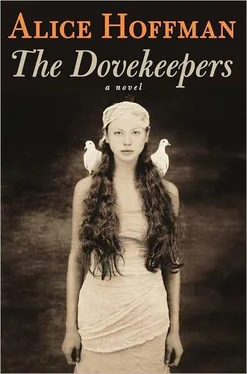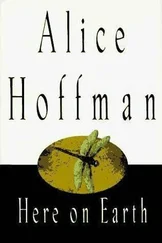Alice Hoffman - The Dovekeepers
Здесь есть возможность читать онлайн «Alice Hoffman - The Dovekeepers» весь текст электронной книги совершенно бесплатно (целиком полную версию без сокращений). В некоторых случаях можно слушать аудио, скачать через торрент в формате fb2 и присутствует краткое содержание. Год выпуска: 2011, ISBN: 2011, Жанр: Историческая проза, на английском языке. Описание произведения, (предисловие) а так же отзывы посетителей доступны на портале библиотеки ЛибКат.
- Название:The Dovekeepers
- Автор:
- Жанр:
- Год:2011
- ISBN:978-1-4516-1749-8
- Рейтинг книги:2.5 / 5. Голосов: 2
-
Избранное:Добавить в избранное
- Отзывы:
-
Ваша оценка:
- 60
- 1
- 2
- 3
- 4
- 5
The Dovekeepers: краткое содержание, описание и аннотация
Предлагаем к чтению аннотацию, описание, краткое содержание или предисловие (зависит от того, что написал сам автор книги «The Dovekeepers»). Если вы не нашли необходимую информацию о книге — напишите в комментариях, мы постараемся отыскать её.
The Dovekeepers — читать онлайн бесплатно полную книгу (весь текст) целиком
Ниже представлен текст книги, разбитый по страницам. Система сохранения места последней прочитанной страницы, позволяет с удобством читать онлайн бесплатно книгу «The Dovekeepers», без необходимости каждый раз заново искать на чём Вы остановились. Поставьте закладку, и сможете в любой момент перейти на страницу, на которой закончили чтение.
Интервал:
Закладка:
I bowed my head then, for I had said enough. A story can be many things to many people. I would give him the story he wanted, but like the scorpion who is hidden in a corner, my story would sting. I knew not to speak of how our people had chosen their death rather than be enslaved. Nor did I suggest that we would be strengthened by my story if I lived to tell it, and that Rome would be haunted by the ghosts of our people, and that a ghost could be stronger than an empire, for it could move people not only to tears but to action.
The general gazed at me. I knew he wanted to hear more of what had happened. How could our people slay themselves and everyone they loved? It was a puzzlement, and even fierce men can be intrigued by a puzzle, though once joined, the pieces may serve to defy them.
When he agreed to my bargain, I approached him.
He told me to speak, and I did exactly as he asked. I told him what he wanted to hear.
We came to Alexandria, because it was there the Witch of Moab belonged, the city she had yearned for when she dreamed of the great river and of her mother and of the white lilies that grew in this city’s gardens. We were brought before the legion in Jerusalem, so that our story might be recorded and written down and sent to Rome. We told it many times, and though we bowed to the strength of the empire, each time we told it a thousand more people learned of the night when we refused to be defeated. The story became a cloud, and the cloud a sheet of rain, and rain fell throughout the empire.
We were released outside the walls of Jerusalem. It had become a city we no longer recognized, and our people were not allowed inside its gates. I sold the gold amulet of the fish to pay for our journey. It had protected us, delivering us from our enemies, and in doing so had served its purpose. I thought of the slave from the north and prayed that his amulet had done as well for him so that he had found his way back to the land where the snow lasted most of the year, where stags that were as swift as the leopard ran across grasslands, where he could be free.
Yehuda traveled with us and lived in our house for several years, but when he became a man he was called to his people. The Essenes had gathered in the north, near Galilee. There were those left among his people who still believed in peace and in the principles of pure devotion to the Almighty. On the day he left us, Revka wept, for she loved him as though he was her own.
Noah and Levi soon enough became young men. Both had honey-colored skin and dark eyes; they were handsome, devoted to their grandmother as she aged. They might have become scholars, as their father had been before fate changed him, but instead they learned the trade of their grandfather. Every morning we were awakened by the scent of bread baking in the domed oven in a shed at the edge of the garden. There were times when I found people at the gate early in the morning, weeping, led here by the scent of bread that reminded them of the bread of their youth, when Jerusalem was ours. Now we are citizens of the world, and the brothers’ bread reflects this: the honey is collected from Egyptian honeybees, the coriander and cumin from Moab, the salt from the shores of the sea the Witch of Moab crossed because she was fated to do so.
As for my son, he is quiet and fearless. He is an excellent student, and speaks four languages, but he is plagued by nightmares. It is only to be expected after all he witnessed, though he would never complain about such things. I discovered his difficulty sleeping because there are nights when I rise to find him sitting in the dark. Sleep is still an unfamiliar country to me, as it is to my son. Perhaps his father speaks to him in his dreams, as mine comes to me. I still possess the assassin’s cloak, the one that is said to have been woven from spiders’ webs, which concealed him from all eyes. I have forgiven him, as I hope that in the World-to-Come he has forgiven me, for I was not blameless. If I was brought before him, I would honor him, for he gave me my life, and for that I will always be grateful.
Every year on the anniversary of the day when the fortress fell, I recount the part of the story I did not tell Silva, although my children know the tale by heart. How the soldiers captured the lion and kept him on a chain and tormented him, how he bided his time, lying in the mud until he was released, how he was set free into the desert, and how he is there still, alone and lonely.
I say that this lion is the king of nothing other than his own freedom. Whether or not the third Temple rises, whether men build palaces or bring cities to ruin, it is the lion who will have to fight for a land of stones. All things change, for that is the way of the world we walk through. But some things remain constant, even after they are gone. I tell my children that we once had a thousand doves and that we set them free, but if we look at the sky we can still see them, even though we are so very far away.
Each year, in the month of Nissan, Yonah and I go to the river on the night before the feast that records our people’s journey out of Egypt, a journey we hope to make again someday when Jerusalem is ours once more. It is a long voyage that we undertake. On this year we celebrate the Blessing of the Sun, for that glorious orb is in the exact same place as it had been during Creation, when God brought forth good and evil, imbuing our world with both at the same hour when he created the word and brought us out of silence, so we might make our own choices. We ride the white donkey we keep in the shed. Revka and I make certain this creature is well cared for, ready if we should ever need to depart suddenly. Our people never know when we may have to flee. Everything that is important we carry with us, whether or not it has been written down.
Yonah is a beautiful child, although with her pale hair and gray eyes she looks nothing like her mother. Still, she is called to the water. I could not keep her away if I tried. I have found her splashing in our courtyard fountain where we keep fish. They do not flee from her, but instead gather around her, as the doves once came to me. That is her element, one she shares with Shirah, who did everything she could to bring this girl forth into this world, even though it was not yet her time, far too early to do so with any assurance of safety. Shirah bled so badly after the birth she would not have survived even if the Angel of Death had not walked among us on that terrible night. We both knew this would come to pass as she drank the rue and stood over the smoke that would begin her labor. She gave her life so that Yonah would have hers. For those who say that the Witch of Moab never loved anyone, that she was selfish, concerned with her own fate alone, I can only say that she was ruined by love and delivered by it and that she left something glorious to the world, a child who loves to stand in the rain.
Our bare feet sink in the mud as we make our way into the waters of the Nile. The river is ink blue. There are sharp, green reeds, and the scent of balsam floats in the air. Women wash their clothes and leave them to dry on rocks along the shore. The men have pulled their boats in, lifting them upon their shoulders and carrying them up the sandy paths. We walk until there are shadows of silver fish darting close by. As the twilight sifts down, we set a candle on a lotus leaf that floats out with the current and watch as it disappears into the dark. This is the reason we are here, to give thanks to our mothers, who are watching over us in the place where we will join them one day, in the World-to-Come.
ACKNOWLEDGMENTS
T he Dovekeepers is a novel set during and after the fall of Jerusalem (7 °C.E.). The book covers a period of four years as the Romans waged war against the Jewish stronghold of Masada, claimed by a group of nine hundred rebels and their families. The story is taken from the historian Josephus, who has written the only account of the siege, in which he reported that two women and five children survived the massacre on the night when the Jews committed mass suicide rather than submit to the Roman Legion. It was they who told the story to the Romans, and, therefore, to the world.
Читать дальшеИнтервал:
Закладка:
Похожие книги на «The Dovekeepers»
Представляем Вашему вниманию похожие книги на «The Dovekeepers» списком для выбора. Мы отобрали схожую по названию и смыслу литературу в надежде предоставить читателям больше вариантов отыскать новые, интересные, ещё непрочитанные произведения.
Обсуждение, отзывы о книге «The Dovekeepers» и просто собственные мнения читателей. Оставьте ваши комментарии, напишите, что Вы думаете о произведении, его смысле или главных героях. Укажите что конкретно понравилось, а что нет, и почему Вы так считаете.












